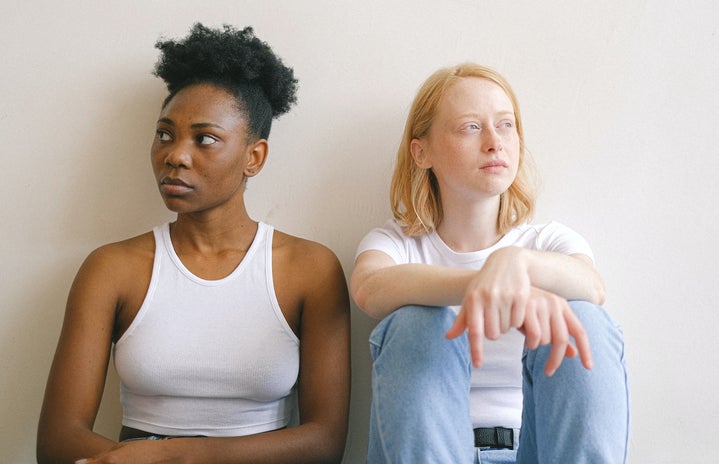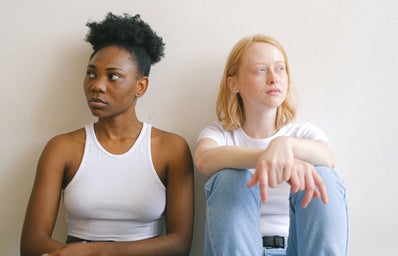Most of us have heard a white woman talk about her desire for “mixed kids.” Many white people don’t see an issue with this, while people of color (POC) tend to feel uncomfortable about that sort of comment.
This kind of rhetoric can be extremely damaging for POC. Comments like this can send a message to children of color that in order to be valued, you must have some amount of white or eurocentric features. It’s heavily implied that you can’t be too Black, too Asian, too Indian, too anything–as long as you have some white in you to tone all that down then apparently you’re in the clear. This entire concept bleeds into the larger issue of POC being dehumanized and reduced to objects for admiration or sex.
Saisree Kumar, a sophomore at CU Boulder from South Asian descent, describes how her experience with racial fetishization has caused her to be “scared of dating white men” altogether.
“A [white] guy I met took me back to his dorm and the first thing I saw was a SZA poster,” Kumar said. “I complimented the poster and this led to a whole rant.” Kumar described how this man mentioned has “historically only dated white girls, but yes, a fine black woman would be my type for sure.” Still engaging in this conversation, the man went on to ask, “who doesn’t love a fat ass?”
For many POC, this kind of language is objectifying, dehumanizing, and disrespectful. By attributing attraction for a woman of color to sexual stereotypes surrounding her race, objectification becomes imminent.
“One time I was talking to this guy who would always put an emphasis on my race, and how he’s never been with a black girl before, and how he’s so excited,” said Thandi Manyothwane, an African-American student who is starting her first semester here at CU. “Someone even asked him if he had ‘jungle fever.’”
Most of the time, microaggressions like this are a major component of racial fetishization. But for some reason, this goes unnoticed by many.
“Racial fetishization is hard to explain to people, because a lot of it is about what is unsaid,” Kumar said.
For the most part, white people tend to think racial fetishization is synonymous with preference or being someone’s “type.”
“I do think you can like certain physical traits over others, but when it comes to the point of only going for someone because they have ‘chocolate skin’ or ‘Asian eyes,’ that’s when it becomes fetishization,” Manyothwane said.
The difference is simple. A racial fetish involves an underlying desire for stereotypes that are attributed, while preference is an attraction to something that “isn’t a characteristic that causes a person to experience discrimination and systemic inequality,” as Natalie Morris states in her article Racial fetishisation: Why it’s racist to say you ‘have a thing’ for Black women.
Adan Marquez, a freshman at CU, described his experience with this issue as a Latino student.
“I was talking to this person and they said that I was their ‘little Mexican who can cook and [is] spicy in bed,’” Marquez said. “I felt off, and it didn’t seem like they liked my personality, more that they liked that they could say they had a Mexican partner.”
Black men are a prominent example of this racial fetishization as well. The assumption “that Black men are going to be well-endowed, perpetuat[es] the stereotype about penis size.” Sexual stereotypes such as this are nothing but harmful, especially when they are being perpetuated in a “open and diverse” environment such as a college campus.
“Being racially reduced to a sexualised object can negatively impact a person’s sense of personal safety, their sense of self, self-esteem and self-worth,” Morris said. College is the societally coined time to figure out who you are. How are students of color supposed to do that when their sense of self is constantly being influenced by these racial stereotypes?
Racial fetishization is also heavily shaped by power dynamics. Historically, we have seen white people hold places of power over POC. This is most evidently shown in the sexual violence that Native Americans endured from European colonizers starting in the 16th century. We can also see this being enforced during the 1800s when enslaved women and children were sexually violated, exploited, and abused by their masters. Dismissing this historical context in regard to the power dynamics we see today would just be ignorant.
Power dynamics in relation to racial classification is a huge part of this issue. As Morris states, the argument of fetishization being an interchangeable term with preference “ignores the specific dynamics of racial power hierarchies that make racial fetishisation different and more damaging than a simple romantic preference.”
To be clear, the intention behind this protest against fetishization is in no way discrediting interracial relationships. What is being said is “that it isn’t racist to say you’re attracted to a Black woman, or an Asian man, as long as you are not attracted to them solely because they are Black or Asian, or because of certain physical features that are frequently attributed to that group,” as Morris states.
In order to dismantle this harmful objectification, we must be able to discern the difference between a preference and a fetish. Not only must we understand how destructive this type of rhetoric and treatment is for all people of color who have endured it, we must also work endlessly to stop it.


